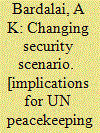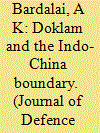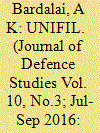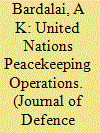| Srl | Item |
| 1 |
ID:
067543


|
|
|
|
|
| Publication |
New Delhi, Knowledge world, 2006.
|
| Description |
xvi, 212p.
|
| Standard Number |
8187966386
|
|
|
|
|
|
|
|
|
|
|
|
Copies: C:1/I:0,R:0,Q:0
Circulation
| Accession# | Call# | Current Location | Status | Policy | Location |
| 050539 | 341.584/BAR 050539 | Main | On Shelf | General | |
|
|
|
|
| 2 |
ID:
157623


|
|
|
|
|
| Summary/Abstract |
On 19 December 2017, three days ahead of the scheduled 20th Round of Indo-China border talk between the Indian National Security Advisor (NSA), Ajit Doval, and China’s State Councillor, Yang Jiechi (the details of which are yet to be made public), the daily Times of India reported a statement by China that the Doklam standoff posed a ‘major test’ for the bilateral ties and that lessons should be learnt from it to avoid a similar situation of its kind in the future.1 China’s statement was made in the context of the face-off between Indian Army and China’s People’s Liberation Army (PLA) in the Doklam plateau (see Figure 1), a disputed area of 89 sq km in western Bhutan, near East Sikkim. The crisis occurred on 8 June 2017, when PLA troops crossed over to the Bhutanese territory with road construction machinery, with the aim of building a motorable road connecting Chumbi Valley and the Doklam Plateau. In response, the Indian Army from the nearby Sikkim garrison quickly moved inside the Bhutanese territory and prevented the PLA from constructing the road. The standoff continued till 28 August when both the countries agreed to pull back their troops with the media hailing it as a diplomatic victory.
|
|
|
|
|
|
|
|
|
|
|
|
|
|
|
|
| 3 |
ID:
146853


|
|
|
|
|
| Contents |
Nations from the developed world have rarely participated in complex and difficult UN peacekeeping operations (PKOs) while those from the developing world have rich peacekeeping experience. The United Nations Interim Force in Lebanon (UNIFIL) is a rare exception among peacekeeping missions as it includes peacekeepers from the North Atlantic Treaty Organization (NATO), along with Western military involvement. NATO members’ involvement in UNIFIL resulted in unusual structures and operational philosophy, and adjusting and adapting to this was difficult for non-Western participants. Despite the differences in training, equipment, culture and tradition amongst the Western and non-Western national contingents, UNIFIL’s contribution in maintaining peace in the region is praiseworthy. The combined effects of the political and military muscles of peacekeepers from Western nations and special skills of the non-Western nations was able to provide much-needed stability to Lebanon, which has not seen a major conflict in almost a decade.
|
|
|
|
|
|
|
|
|
|
|
|
|
|
|
|
| 4 |
ID:
163381


|
|
|
|
|
| Summary/Abstract |
Decades after the deployment of the first peacekeeping operation (PKO)—United Nations Truce Supervision Organization (UNTSO)—in 1948, the United Nations (UN) cannot boast of too many successes. The continued relevance of UN PKOs has thus come under criticism. In order to determine whether UN PKOs are still relevant, it is necessary to obtain a clear understanding of the reasons/factors for their success and failure, and thereafter assess their performance. Based on the author’s personal experience of peacekeeping and prior research, this article seeks to highlight a few factors that have an overriding influence on the outcome of a PKO. The article also attempts to provide a perspective on the relevance of the PKO in context of the challenges they face regarding planning, deployment and execution of such operations.
|
|
|
|
|
|
|
|
|
|
|
|
|
|
|
|